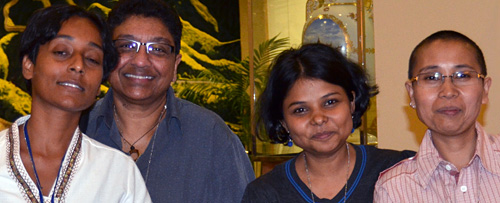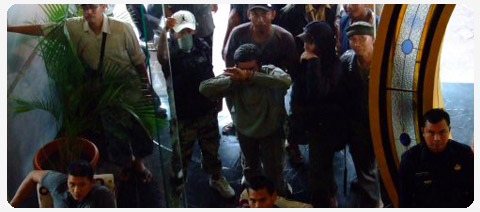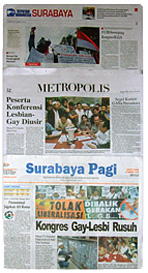
By Grace Poore
Regional Program Coordinator for Asia and the Pacific Islands
Women’s human rights defenders from Indonesia arrived in New York this week to report to the Committee for the Elimination of Discrimination Against Women (CEDAW) about flagrant violations experienced by women and girls in Indonesia across all sectors of society – female circumcision, unsafe abortions, forced sterilization of minority women, marital rape, polygamy, weak implementation of the domestic violence law, police abuses, abuses by domestic worker recruitment agencies, failure to grant reparations to women sexually violated during conflicts with the Indonesian military and police forces, judicial disregard for violence and discrimination against women, rampant abuses against women migrant workers, and many more.
Yet, violence and discrimination against lesbians, bisexual women and transgender (LBT) women was not on the agenda. The spread of intolerance by religious fundamentalists had driven a wedge within the Indonesian women’s movement. Except for one 145-page shadow report that mentioned sexual orientation and gender identity (SOGI) once, LBT people were invisible. Even Komnas Perempuan, the National Commission of Women was reluctant to raise LBT issues. As one Commissioner explained, “The fundamentalists are saying that when we push for women’s rights we are pushing for same sex marriage. So if we bring up LBT, it will weaken our advocacy.” Another Commissioner assured me, “We can raise the LBT issue at the next CEDAW session.” But that would be five years down the road!
Sri Agustine, director of Ardhanary Institute, a national LBT organization in Indonesia admits, “When I arrived in New York, I was pessimistic because I was the only one from my organization, and the other NGOs [non-governmental organizations] did not want to mention LBT issues because [other] women’s issues were urgent. But I’m a woman also.”
 L to R: Sherlina Nageer from Guyana, Grace Poore from IGLHRC, Dorathy Benjamin from IWRAW Asia Pacific, Sri Agustine from Ardhanary Institute. (Photo courtesy of Ardhanary Institute.)
L to R: Sherlina Nageer from Guyana, Grace Poore from IGLHRC, Dorathy Benjamin from IWRAW Asia Pacific, Sri Agustine from Ardhanary Institute. (Photo courtesy of Ardhanary Institute.)
Women’s NGOs Exclude LBT Issues
Since 2000, LBT people in Indonesia have been part of the women’s movement, fighting for equality for all Indonesian women. Yet the CEDAW Convention does not apply to LBT people because LBT rights are not seen as women’s rights by the Indonesian state. This attitude is in part due to the resistance of women’s NGOs to recognize the multi-dimensional discrimination and “layered violence” that LBT people face for being women and also because of their sexual orientation and gender identity.
Agustine was pressured not to make any statements about LBTs to the CEDAW Committee. It saddened me to see how the forces of religious extremism had managed to compartmentalize advocacy and silence even those who were allies – allies who quietly supported LBT people but publicly could not afford to be associated with LBT rights.
The International Gay and Lesbian Human Rights Commission (IGLHRC) was aware that in Indonesia, fundamentalist thugs were calling up LBT groups and leaving threatening telephone messages, stalking LBT activists, violently disrupting human rights workshops and film festivals, halting conferences, using the media to incite violence against LBT people, and posting stickers on restaurant windows and banners in public spaces that said, “Destroy Gays and Lesbians.” This climate of hate and intolerance in the name of religion and morality has grown steadily since 2008 and exposed the LGBT community in general to vigilante attacks, police complicity with attackers, curbing freedom of association and assembly, stifling freedom of expression, and eroding LGBT people’s access to justice.
Decentralization
Ironically, these human rights erosions grew out of the decentralization process initiated by the Indonesian government to grant autonomy to local provinces and districts so they could govern themselves, including create their own local laws (or bylaws). Religious extremists usurped the decentralization process to create discriminatory bylaws in their provinces and enforce them with impunity in the name of morality and religion. They targeted sexual rights, reproductive rights, women’s rights and LBT rights. They regulated what women wore, the length of their hair, what public spaces they could access, and how they appeared – with penalties for butch lesbians (lesbian tomboys) for not looking “feminine enough” or transgender women (waria) for “acting like women.”
Ardhanary Institute reports that since 2008, employment discrimination and sexual bullying in schools sharply increased because of the “spread of intolerance.” By 2010, family violence against LBT people had doubled in Jakarta, the capital city, and tripled in the provinces outside Jakarta. Lesbians, particularly lesbian tomboys were increasingly being “sexually abused by fathers, uncles and brothers to change the sexual orientation of lesbians.” Those who risked going to the police faced ridicule and blame for provoking the violence and were lectured by police officers to change their sexual orientation and gender identity. Reports on the violence were quashed by police to prevent “smearing family reputation.”
According to Komnas Perempuan, the Indonesian Women’s Commission, the Ministry of Home Affairs was not properly monitoring and ensuring that the local bylaws were nondiscriminatory and in compliance with international human rights treaties that Indonesia has ratified, including the CEDAW Convention.
These realities challenged the suggestion that LBT people could wait another five years before their issues were brought to the CEDAW Committee. Agustine and I negotiated with the NGOs. Finally, they allocated eight minutes out of seventy minutes, which was fair given the number of NGOs wanting precious face time with CEDAW Committee members. Following our presentations, Komnas Perempuan and the leadership of the CEDAW Working Group of Indonesia revised their statements to include SOGI. They requested from Ardhanary Institute a regular supply of data so they could include it in their educational materials.
State Review
On the morning of July 11, Agustine walked into the room where the 52nd session of the CEDAW Committee would commence, a broad smile on her face, eyes shining. “I feel confident,” she said, having earned the support of the other activists, her sisters in struggle.
The first question on LBT rights violations was raised by Patricia Schulz, CEDAW expert from Switzerland: “The bylaws on adultery passed in Aceh, if implemented, would expose adulterers to death by stoning, and LBT persons to caning, 100 lashes. This law is pending implementation. These bylaws represent grave violations of the rights of women to life, liberty and security… there is no commitment of the government to challenge these local and provincial laws. So I ask if your government plans to systematically review the local and provincial laws and strike down all the provisions that are discriminatory to women. You have the authority and the mechanisms to do so. Let me comment that decentralisation cannot mean that the human rights of women are invalidated at the local and provincial level. Democracy and rule of law, including anti-discrimination and equality law have to walk hand in hand, at all levels of the State structure. Governments are responsible for upholding the obligations arising from ratified human rights treaties, so I hope that you will give us very good news on that respect at our next constructive dialogue.”
The second question came from Silvia Pimentel, CEDAW expert from Brazil and Chair of the Committee: “Due to different risks associated with being identified as lesbians, bisexual, or transgender, LBT people who experience violence by family are reluctant to report their cases to police. Could the State: (a) enhance operational procedures, such as victim representation and witness protection? (b) sensitize frontline staff through training to address these specific fears?”
Harkristuti Harkrisnowo, Director-General of Human Rights in Indonesia’s Ministry of Justice and Human Rights responded, “The allegation about criminalization of LBT is incorrect because Indonesia does not criminalize LBT groups.” He added, “Regarding the punishment in Aceh, the law is not in place yet.”
Harkrisnowo stonewalled. He did not shed light on what measures the state would take to ensure protections. True, Indonesia has no sodomy law like many other Muslim countries in the region. But there are laws that disproportionately affect transgender people like the vagrancy and public order laws. The Anti Pornography Law classifies homosexuality as a “deviant act” that is punishable with jail and a fine.
In addition, a total of 154 local bylaws, regulate how women dress, including lesbians and lesbian tomboys who are punished for not appearing “feminine enough” and effeminate men and transgender women are punished for “acting like women.” Other bylaws force women to cover their heads, control what public places they can socialize in, and how late they stay out – all of which directly and indirectly affect LBT people.
The most egregious of the discriminatory local bylaws is the Aceh adultery law that was passed in 2009 by religious hardliners in the Aceh government. If this law is implemented, heterosexual people will be stoned to death for adultery and LGBT people will be caned 100 times and face 8.5 years in prison for homosexuality, which the law defines as sexual activity outside marriage. Civil society groups have filed for judicial review with the Indonesia Supreme Court. To date, there has been no decision. IGLHRC has learned that the new governor of Aceh favors amending the law. LGBT groups in Aceh fear that even if stoning is removed, the penalties for homosexuality could remain unless there is greater solidarity.
As Agustine said after a long day, “SOGI needs to be included in the definition of discrimination against women in Article 1 of the CEDAW Convention. The Indonesian government needs to ensure that Indonesian LBT people have equal access to the law and justice. The Indonesian government needs to promote acceptance of sexual and gender diversity among non-state actors and destigmatize our issues.”

